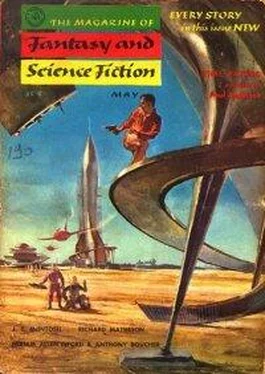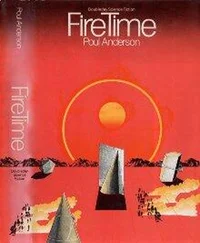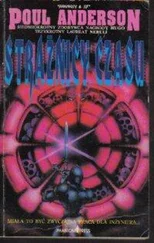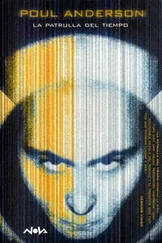Poul Anderson - Time Patrol
Здесь есть возможность читать онлайн «Poul Anderson - Time Patrol» весь текст электронной книги совершенно бесплатно (целиком полную версию без сокращений). В некоторых случаях можно слушать аудио, скачать через торрент в формате fb2 и присутствует краткое содержание. Год выпуска: 1955, Издательство: Fantasy House, Inc., Жанр: Альтернативная история, на английском языке. Описание произведения, (предисловие) а так же отзывы посетителей доступны на портале библиотеки ЛибКат.
- Название:Time Patrol
- Автор:
- Издательство:Fantasy House, Inc.
- Жанр:
- Год:1955
- ISBN:нет данных
- Рейтинг книги:4 / 5. Голосов: 1
-
Избранное:Добавить в избранное
- Отзывы:
-
Ваша оценка:
- 80
- 1
- 2
- 3
- 4
- 5
Time Patrol: краткое содержание, описание и аннотация
Предлагаем к чтению аннотацию, описание, краткое содержание или предисловие (зависит от того, что написал сам автор книги «Time Patrol»). Если вы не нашли необходимую информацию о книге — напишите в комментариях, мы постараемся отыскать её.
Time Patrol — читать онлайн бесплатно полную книгу (весь текст) целиком
Ниже представлен текст книги, разбитый по страницам. Система сохранения места последней прочитанной страницы, позволяет с удобством читать онлайн бесплатно книгу «Time Patrol», без необходимости каждый раз заново искать на чём Вы остановились. Поставьте закладку, и сможете в любой момент перейти на страницу, на которой закончили чтение.
Интервал:
Закладка:
London, 1947. He sat for a moment, reflecting that at this instant he himself, seven years younger, was attending college back in the States. Then Whitcomb shouldered past the watchman and took his hand. “Good to see you again, old chap,” he said. His haggard face lit up in the curiously charming smile which Everard had come to know. “And so Victoria, eh?”
“Reckon so. Jump on.” Everard reset. This time he would emerge in an office. A very private inner office.
It blinked into existence around him. There was an unexpectedly heavy effect to the oak furniture, the thick carpet, the flaring gas mantles. Electric lights were available, but Dalhousie Roberts was a solid, conservative import house. Mainwethering himself got out of a chair and came to greet them: a large and pompous man with bushy side whiskers and a monocle. But he had also an air of strength, and an Oxford accent so cultivated that Everard could hardly understand it.
“Good evening, gentlemen. Pleasant journey, I trust? Oh, yes… sorry… you gentlemen are new to the business, eh, what? Always a bit disconcerting at first. I remember how shocked I was on a visit to the twenty-first century. Not British at all… Only a res naturae, though, only another facet of an always surprising universe, eh? You must excuse my lack of hospitality, but we really are frightfully busy. Fanatic German up in 1917 learned the time-travel secret from an unwary anthropologist, stole a machine, has come to London to assassinate Her Majesty. We’re having the devil’s own time finding him.”
“Will you?” asked Whitcomb.
“Oh, yes. But deuced hard work, gentlemen, especially when we must operate secretly. I’d like to engage a private inquiry agent, but the only worthwhile one is entirely too clever. He operates on the principle that when one has eliminated the impossible, whatever remains, however improbable, must be the truth. And time trafficking may not be too improbable for him.”
“I’ll bet he’s the same man who’s working on the Addleton case, or will be tomorrow,” said Everard. “That isn’t important; we know he’ll prove Rotherhithe’s innocence. What matters is the strong probability that there’s been hanky-panky going on back in ancient British times.”
“Saxon, you mean,” corrected Whitcomb, who had checked on the data himself. “Good many people confuse British and Saxons.”
“Almost as many as confuse Saxons and Jutes,” said Mainwethering blandly. “Kent was invaded from Jutland, I understand… Ah. Hm. Clothes here, gentlemen. And funds. And papers, all prepared for you. I sometimes think you field agents don’t appreciate how much work we have to do in the offices for even the smallest operation. Haw! Pardon. Have you a plan of campaign?”
“Yes.” Everard began stripping off his twentieth-century garments. “I think so. We both know enough about the Victorian era to get by. I’ll have to remain American, though… yes, I see you put that in my papers.”
Mainwethering looked mournful. “If the barrow incident has gotten into a famous piece of literature as you say, we will be getting a hundred memoranda about it. Yours happened to come first. Two others have arrived since, from 1923 and 1960. Dear me, how I wish I were allowed a robot secretary!”
Everard struggled with the awkward suit. It fitted him well enough, his measurements were on file in this office, but he hadn’t appreciated the relative comfort of his own fashions before. Damn that waistcoat! “Look here,” he said, “this business may be quite harmless. In fact, since we’re here now, it must have been harmless. Eh?”
“As of now,” said Mainwethering. “But consider. You two gentlemen go back to Jutish times and find the marauder. But you fail. Perhaps he shoots you before you can shoot him; perhaps he waylays those we send after you. Then he goes on to establish an industrial revolution or whatever he’s after. History changes. You, being back there before the change-point, still exist… if only as cadavers… but we up here have never been. This conversation never took place. As Horace puts it—”
“Never mind!” laughed Whitcomb. “We’ll investigate the barrow first, in this year, then pop back here and decide what’s next.” He bent over and began transferring equipment from a twentieth-century suitcase to a Gladstonian monstrosity of flowered cloth. A couple of guns, some physical and chemical apparatus which his own age had not invented, a tiny radio with which to call up the office in case of trouble.
Mainwethering consulted his Bradshaw. “You can get the 8:23 out of Charing Cross tomorrow morning,” he said. “Allow half an hour to get from here to the station.”
“Okay.” Everard and Whitcomb remounted their hopper and vanished. Mainwethering sighed, yawned, left instructions with his clerk, and went home. At 7:45 a.m. the clerk was there when the hopper materialized.
4
This was the first moment that the reality of time travel struck home to Everard. He had known it with the top of his mind, been duly impressed, but it was, for his emotions, merely exotic. Now, clopping through a London he did not know in a hansom cab (not a tourist-trap anachronism, but a working machine, dusty and battered), smelling an air which held more smoke than a twentieth-century city but no gasoline fumes, seeing the crowds which milled past—gentlemen in bowlers and top hats, sooty navvies, long-skirted women, and not actors but real, talking, perspiring, laughing and somber human beings off on real business—it hit him with full force that he was here. At this moment his mother had not been born, his grandparents were young couples just getting settled to harness, Grover Cleveland was President of the United States and Victoria was Queen of England, Kipling was writing and the last Indian uprisings in America yet to come… It was like a blow on the head.
Whitcomb took it more calmly, but his eyes were never still as he watched this day of England’s glory. “I begin to understand,” he murmured. “They never have agreed whether this was a period of unnatural, stuffy convention and thinly veneered brutality, or the last flower of Western civilization before it started going to seed. Just seeing these people makes me realize; it was everything they have said about it, good and bad, because it wasn’t a simple thing happening to everyone, but millions of individual lives.”
“Sure,” said Everard. “That must be true of every age.”
The train was almost familiar, not very different from the carriages of British railways anno 1954, which gave Whitcomb occasion for sardonic remarks about inviolable traditions. In a couple of hours it let them off at a sleepy village station among carefully tended flower gardens, where they engaged a buggy to drive them to the Wyndham estate.
A polite constable admitted them after a few questions. They were passing themselves off as archeologists, Everard from America and Whitcomb from Australia, who had been quite anxious to meet Lord Wyndham and were shocked by his tragic end. Mainwethering, who seemed to have tentacles everywhere, had supplied them with letters of introduction from a well-known authority at the British Museum. The inspector from Scotland Yard agreed to let them look at the barrow—“the case is solved, gentlemen, there are no more clues, even if my colleague does not agree, hah, hah!” The private agent smiled sourly and watched them with a narrow eye as they approached the mound; he was tall, thin, hawk-faced, and accompanied by a burly, mustached fellow with a limp who seemed a kind of amanuensis.
The barrow was long and high, covered with grass save where a raw scar showed excavation to the funeral chamber. This had been lined with rough-hewn timbers but had long ago collapsed; fragments of what had been wood still lay on the dirt. “The newspapers mentioned something about a metal casket,” said Everard. “I wonder if we might have a look at it too?”
Читать дальшеИнтервал:
Закладка:
Похожие книги на «Time Patrol»
Представляем Вашему вниманию похожие книги на «Time Patrol» списком для выбора. Мы отобрали схожую по названию и смыслу литературу в надежде предоставить читателям больше вариантов отыскать новые, интересные, ещё непрочитанные произведения.
Обсуждение, отзывы о книге «Time Patrol» и просто собственные мнения читателей. Оставьте ваши комментарии, напишите, что Вы думаете о произведении, его смысле или главных героях. Укажите что конкретно понравилось, а что нет, и почему Вы так считаете.












